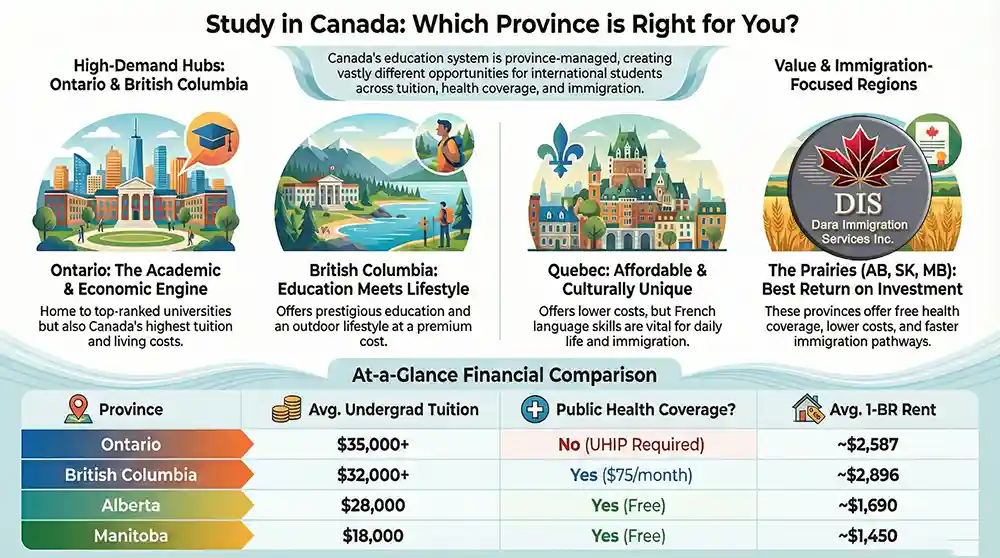Education in Canada
Education in Canada Overview 2026-2027
To access Education in Canada is to open a door to global opportunities, world-class research, and a pathway to permanent residence. For the thousands of international students arriving under the new 2026 International Student Cap, the goal is not just a degree—it is a strategic investment in their future.

However, the Canadian education system is decentralized, meaning every province operates like a separate country with its own tuition rates, health insurance rules, and designated learning institutions (DLIs). Navigating these differences is essential to avoiding costly mistakes.
At Dara Immigration Services, we help students move beyond the brochure to understand the realities of studying abroad. This guide is your blueprint to navigating Education in Canada successfully, ensuring your academic choices align with your long-term immigration goals.
The Canadian Education System
Unlike many countries with a central federal education ministry, Education in Canada is exclusively managed by the provinces. This means the rules for student loans, health coverage, and graduation requirements change the moment you cross a provincial border.
Despite these differences, all “Designated Learning Institutions” (DLIs) meet strict federal standards, ensuring your credential is recognized globally.
Quick Facts: Education in Canada at a Glance
- Academic Year: September to April (Two Semesters).
- Average Undergrad Tuition: CAD $20,000 – $40,000 per year.
- Primary Benefit: Post-Graduation Work Permit (PGWP) eligibility.
- Language of Instruction: English (majority) and French (Quebec/NB).
- Global Rank: Consistently in the Top 5 for Higher Education Quality.
Education in Canada by Province
To choose the right school, you must understand the province it is located in. Here is a breakdown of the major study destinations.
Ontario & Central Canada
Ontario is the academic hub of Canada, hosting the highest number of international students and top-ranked research universities.
Ontario
- Top Institutions: University of Toronto, University of Waterloo, McMaster University.
- Health Insurance: International students are not covered by the public plan (OHIP). You must purchase the University Health Insurance Plan (UHIP), costing approx. $756 per year.
- Tuition & Cost: Highest in Canada. Engineering or Business degrees can range from $40,000 to $60,000+ per year.
- Lifestyle & Culture: Urban and competitive. Students in Toronto enjoy a fast-paced city life, while those in Ottawa or Kingston experience a more historic, student-focused atmosphere.
Quebec
- Top Institutions: McGill University, Université de Montréal, Concordia University.
- Health Insurance: Public coverage (RAMQ) is restricted to students from specific countries (e.g., France, Belgium). All others must buy private insurance (approx. $1,000/year).
- Language Profile: While McGill and Concordia teach in English, learning French is vital for daily life and accessing the PEQ immigration stream.
- Tuition & Cost: Generally lower than Ontario, with rents in Montreal averaging $1,700 (2026 est), making it a student-favorite city.
British Columbia & The West
BC offers a unique blend of prestigious education and an outdoor lifestyle, though costs are significant.
British Columbia
- Top Institutions: University of British Columbia (UBC), Simon Fraser University (SFU), BCIT.
- Health Insurance: Students with a study permit valid for 6+ months qualify for the public Medical Services Plan (MSP). There is a monthly fee of approx. $75.
- Tuition & Cost: High. Vancouver rents are the most expensive in Canada ($2,896+), and tuition reflects the global demand for BC degrees.
- Lifestyle & Culture: Relaxed and nature-oriented. Students often balance coursework with hiking, skiing, or beach activities.
The Prairies (Alberta, Saskatchewan, Manitoba)
These provinces offer the best “Return on Investment” due to lower living costs and aggressive immigration pathways for graduates, hence they are some of the best regions to continue your Education in Canada.
Alberta
- Top Institutions: University of Alberta, University of Calgary.
- Health Insurance: Students with a 12-month study permit are eligible for free coverage under the AHCIP.
- Tuition & Cost: Moderate. With no provincial sales tax and lower rents ($1,690 in Calgary), your student budget goes further here.
Manitoba & Saskatchewan
- Top Institutions: University of Manitoba, University of Saskatchewan.
- Health Insurance: Both provinces offer free public health coverage to international students with valid study permits.
- Immigration Edge: Both provinces have specific PNP streams prioritizing graduates from their local institutions, offering a faster route to PR.
Tuition & Coverage Comparison (2026)
Use this table to compare the financial reality of studying in different regions.
| Province | Avg Undergrad Tuition | Public Health Coverage? | Avg Rent (1-Bdrm) | Top Industry for Grads |
| Ontario | $35,000+ | No (UHIP Required) | ~$2,587 | Finance / Tech |
| British Columbia | $32,000+ | Yes ($75/month) | ~$2,896 | Green Tech / Film |
| Quebec | $25,000+ | Restricted (Country based) | ~$1,700 | AI / Aerospace |
| Alberta | $28,000 | Yes (Free) | ~$1,690 | Energy / Eng. |
| Manitoba | $18,000 | Yes (Free) | ~$1,450 | Agri-Tech |
| Nova Scotia | $20,000 | No (Wait 12 months) | ~$2,064 | Ocean Sciences |
How to Prepare for Your Education in Canada
Securing your right to study is a multi-step legal process, hence you must prepare for your Education in Canada.
Pre-Arrival: The Application
- Get Accepted: You need a Letter of Acceptance (LOA) from a DLI.
- Secure Provincial Attestation: Under new 2026 rules, most undergraduate students need a Provincial Attestation Letter (PAL) to prove they fit within the cap.
- Prove Your Funds: You must show access to $20,635 (cost of living) plus your first year of tuition.
Your First Week: Settlement
- Activate Your Permit: Receive your actual Study Permit document at the port of entry (airport). Check for working conditions (e.g., “Authorized to work 20/24 hours”).
- Get Your SIN: Visit Service Canada to get a Social Insurance Number so you can work part-time.
Long-Term: The PGWP
- Maintain Status: You must remain a full-time student. Dropping to part-time status can disqualify you from the Post-Graduation Work Permit.
- Plan for Graduation: Apply for your PGWP within 180 days of receiving your final marks.
Challenges of Education in Canada
Education in Canada is an incredible opportunity, but it is not without hurdles.
Challenge #1: The Cost of Living Crisis
- The Reality: Tuition is frozen at many schools, but rent is not. Sharing a bedroom or living in a basement suite is the norm for students in Toronto and Vancouver.
- The Strategy: Consider “polytechnic” colleges in mid-sized cities (like London, ON or Kelowna, BC) where rent is 30% cheaper but education quality remains high.
Challenge #2: Changing Immigration Rules
- The Reality: A Canadian degree no longer guarantees Permanent Residence. Federal draws are increasingly category-based (healthcare, trades, French speakers).
- The Strategy: Choose your program based on labour market needs, not just personal interest. Consult with an RCIC before declaring your major.
Frequently Asked Questions (FAQ)
- Can I work while studying?
Yes. Most study permits allow you to work up to 24 hours per week off-campus during academic sessions and full-time during scheduled breaks (like summer).
- What is a “Designated Learning Institution” (DLI)?
A DLI is a school approved by a provincial government to host international students. You must attend a DLI to get a study permit. However, not all DLIs make you eligible for a Post-Graduation Work Permit (PGWP).
- Do I need an IELTS score for university?
Yes, unless you are from an English-speaking country. Most universities require an IELTS Academic score of 6.5 (with no band below 6.0), though some colleges accept an overall score of 6.0.
- Is health insurance free for international students?
It depends on the province. In Alberta, Saskatchewan, and Manitoba, you may be eligible for free provincial coverage. In Ontario and Quebec, you typically must pay for private insurance (UHIP or Blue Cross).
- Can my spouse come with me?
Yes, but spousal open work permit eligibility has tightened in 2026. Spouses of undergraduate students in non-professional programs (like general arts or business diplomas) may no longer qualify for an open work permit.

Professional Immigration Assistance
Your education is the most expensive investment you will ever make. Don’t risk it with a rejected visa application or a program that doesn’t lead to your immigration goals. The rules for Education in Canada have changed drastically in 2026.
Ensure your study plan is legally sound. Contact Dara Immigration Services today for a student visa assessment.
Disclaimer: This article provides general information regarding the Canadian education system and study permits. It does not constitute legal advice.
Download:
Download the bulletin of Education in Canada as a PDF.
Download “Education-in-Canada-Bulletin-2026-2027.pdf” Education-in-Canada-Bulletin-2026-2027.pdf – Downloaded 32 times – 1.62 MB